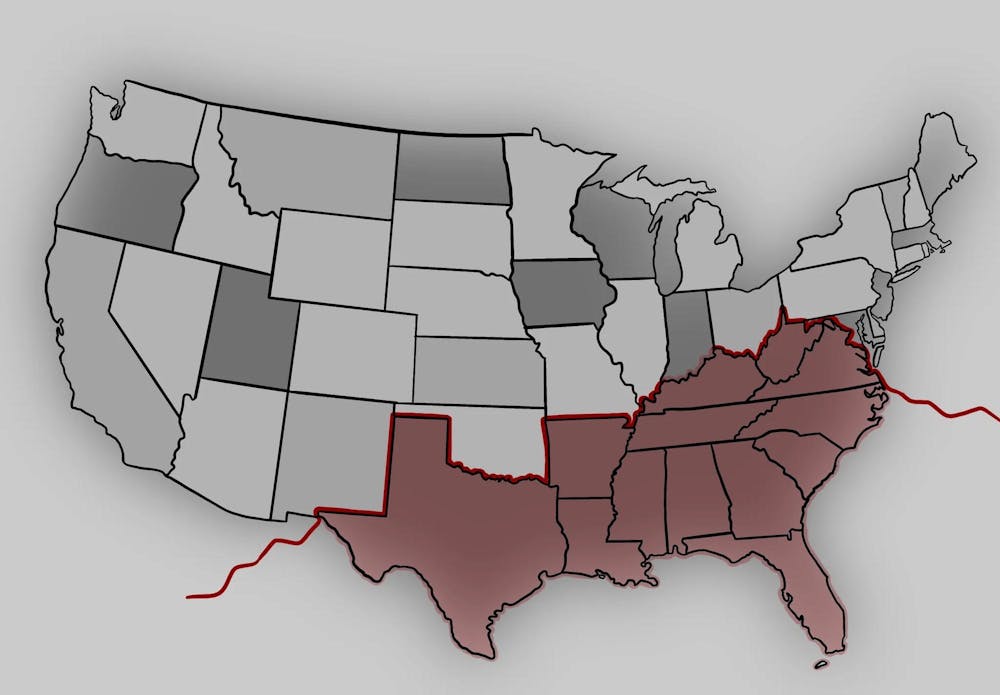As election season draws to a close, another American tradition takes its place: scapegoating. The discourse surrounding rural voters has reached an all-time high across social media and, more worryingly, across campus. In an effort to place blame for the result of the presidential election, students are perpetuating harmful stereotypes of rural communities: just last week, in my history lecture, for instance, students were debating whether to liken Trumpism to a psychological failing. If you know anything about hookworms, you know just how dangerous conversations such as this can be. This alienation shows the lack of understanding of the systemic issues that plague these rural communities. To foster meaningful progress as a nation, we must fundamentally transform how we communicate about and with one another, emphasizing respect and understanding rather than blame.
If my peers are to correlate the fact that Oklahoma is one of two states in the country to have zero blue counties and its ranking as 49th in education, then they must also acknowledge mass disenfranchisement and the state’s tumultuous relationship with the word “education.” If my peers are to blame rural Georgians for the state flipping red, then my peers must also acknowledge Georgians’ genuine economic distress from rising inflation. If my peers are to post on Instagram that they hold no sympathy for Trump supporters, then they are condemning those in Southwestern Pennsylvania whose primary source of income is now an abandoned mine.
These presumptions and misinterpretations fail to account for the systemic issues that plague large swaths of the country. Blaming rural voters is not activism, and those aiding in creating this environment of judgment are not only anti-progressive but performative. Refusing to engage with larger societal issues as possible causes for political turmoil reveals not an individual who wants to help but an individual who is solely concerned with virtue signaling.
We as Brown students know all too well the historical atrocities that have plagued our country, so why would we not take these into account when attempting to understand the thoughts of Trump supporters? Understanding America means understanding how systemic issues affect all Americans. The two are not mutually exclusive.
How can we proclaim to be the more tolerant party and stand against the vilification of minorities, but allow unfounded attacks on middle America? Just like our more right-leaning counterparts, we enforce the dynamics that create a larger culture of blame that impedes progress. This campus has no shortage of student activist organizations that preach equity and justice, but activism must include those you disagree with, or it simply isn’t activism. Anyone who proclaims Black Lives Matter must declare that Black Trump Supporter Lives Matter. Anyone who fights for women’s reproductive rights needs also to fight for the reproductive rights of pro-life women. And anyone who isn’t is not an activist.
Donald Trump won in a landslide not because Democratic messaging was too “woke” or because of Trump’s “superior” economic policy, but because this country has lost its ability to empathize. Donald Trump is the consequence of a nation that has forgotten that we are one. Who we are as a country isn’t determined on Election Day but every day after that. This election is over, but the work to make this country hospitable is not.
I concede that Southern and Middle America is littered with those whose worldview would not want me at this university, let alone writing this piece. However, at the same time, I acknowledge and understand the gerrymandering, voter suppression, and decline in public investment that facilitates these attitudes. I know some may say that conversing with those who disagree with their very being is where they draw the line, and once again, I agree, but that does not mean we falter in our pursuit to create a world where these prejudices don’t exist.
I am from Oklahoma and attend an Ivy League university, but, that does not make me any more capable of understanding this country’s problems. Rural Georgians understand this nation’s challenges just as well as you do. Civic capacity is determined by one’s willingness to make this country a better place, not the degree one holds, and we, as Brown students, would do well to remember that. So no, you cannot say that Trump supporters are stupid. That’s unconstructive, wrong, and flat-out mean. Didn’t your mother ever tell you that?
Christian Davis ’27 can be reached at christian_davis@brown.edu. Please send responses to this column to letters@browndailyherald.com and other opinions to opinions@browndailyherald.com.





